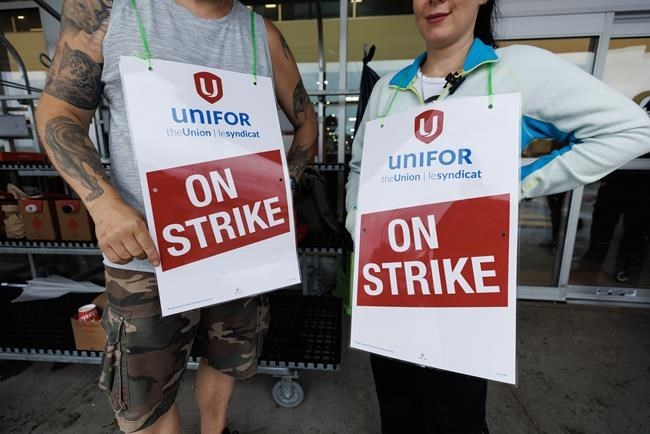It was Samantha Henry’s first time on strike, and one that made headlines across the country.
“Some people thought the strike would only last a week, a couple of days. And we went into almost five weeks,” said Henry, one of some 3,700 Metro employees in the Toronto area who walked off the job this summer.
In previous rounds of bargaining that didn't lead to strikes, Henry says public feedback over workers' demands was often negative.
“It was all like ... ‘What do you expect? She's a retail worker.’”
This summer felt different. People, including many regular Metro customers, joined workers on picket lines, promised to boycott Metro-owned stores, honked car horns as they drove past and brought gift cards, coffee and snacks.
“I think I ate more doughnuts and Timbits than I ever have in my entire life,” joked Henry.
She thinks the pandemic helped open people’s eyes to how essential retail workers are, noting that many regular customers were irate when grocery stores took workers’ "hero pay" away. But that’s not the whole story. Inflation and rising interest rates have eaten into everyone’s bottom line, and Henry thinks customers are more aligned with the plight of lower-paid workers as a result.
“I think that the sympathy for striking workers is being driven by an affordability crisis that has hit all workers, regardless of union status,” said Larry Savage, a professor in the labour studies department at Brock University.
According toanalytics firm Gallup, U.S. approval of unions is at its highest point in more than 50 years.
Union support is harder to measure in Canada because it's not regularly tracked, but people on the front lines of strikes and those who study labouragree that public sympathy for strikes is stronger than usual here, too.
A recent poll by the Angus Reid Institute suggested that union support in Canada is relatively high, though it's hard to contextualize the results without a previous record to compare with, said Adam King, an assistant professor in the labour studies department at the University of Manitoba.
But support for the high-profile Metro strike illustrated that union messaging is hitting home for many Canadians, he said: “There's been a public spotlight on the profits of the grocery sector and the fact that food price inflation continues to outstrip overall inflation. So there's something really kind of visceral and personal about that.”
Labour experts in Canada usually have to rely on polls about individual labour disputes to gauge public sentiment, and these vary, said Savage.
Historically, unions had a negative public image in part because ofthe disruption strikes can cause, he said. One memorable example is the 2009 strike by City of Toronto workers that notably affected garbage collection.
Public support varies because it often hinges on the nature of the strike, said Savage. It’s easier for the average citizen to support a strike that doesn't directly affect them than one they can’t ignore — like if their flight to Hawaii is cancelled, or if the summer air is heavy with the smell of hot garbage.
But in more recent polls on individual disputes, Savage said he’s been surprised by the level of support.
For example, an Abacus poll on the dispute between the Ontario government and education workers last year showed more Ontarians blamed the government, not workers, for the dispute. Almost half said they would support other unions walking off the job in solidarity.
Months later, when 155,000 federal government workers under the Public Service Alliance of Canada went on strike, an Angus Reid Institute poll showed strong support for almost every union demand, noted Savage.
“You don't typically see that level of sympathy for public-sector workers,” he said.
Bea Bruske, president of the Canadian Labour Congress, said she's also noticed a shift at picket lines and rallies across the country.
“The level of public support and understanding of the need to strike ... is higher than it's been in many, many years,” she said.
In the private sector, the general public has little sympathy for giant, profitable corporations, a feeling that’s been heightened in recent years and that Unifor exploited successfully against Metro, Savage said.
Support from both the national union and the broader community can help get a bargaining committee over the line, said Mario Moceri, a national service staff representative with Unifor who supported around 250 workers at the Windsor Salt Mine in a seven-month dispute this year, leading to a deal ratified in late August.
It also helps send a message to the employer amid negotiations, said Moceri: “I think they knew we were in this for the long haul.”
In some cases, public support is really important for successful bargaining, said King, while in other disputes it matters less.
"But what I think is really just encouraging over the last little while is that public support is on side, even in cases where it looks like it would be less consequential," he said.
Savage said public support can help keep spirits high on the picket line.
“There is nothing worse than a worker on a picket line who's being spat on and told that they're greedy, and to get back to work. That can have a very demoralizing effect on people."
Public support plays a heightened role in public-sector bargaining, because it's taxpayer money on the line, said Savage. Talks often come down to disagreements over things like classroom sizes and transit regularity.
“That kind of public support is key in public-sector labour relations, because governments pay a political price for precipitating a strike and disrupting services that people rely on.”
But the public’s heightened support of striking workers isn’t something unions can count on to last, said Savage.
“There is this real window of opportunity, and it’s not going to be there forever,” he said.
This report by The Canadian Press was first published Sept. 17, 2023.
Companies in this story: (TSX:MRU)
Rosa Saba, The Canadian Press


